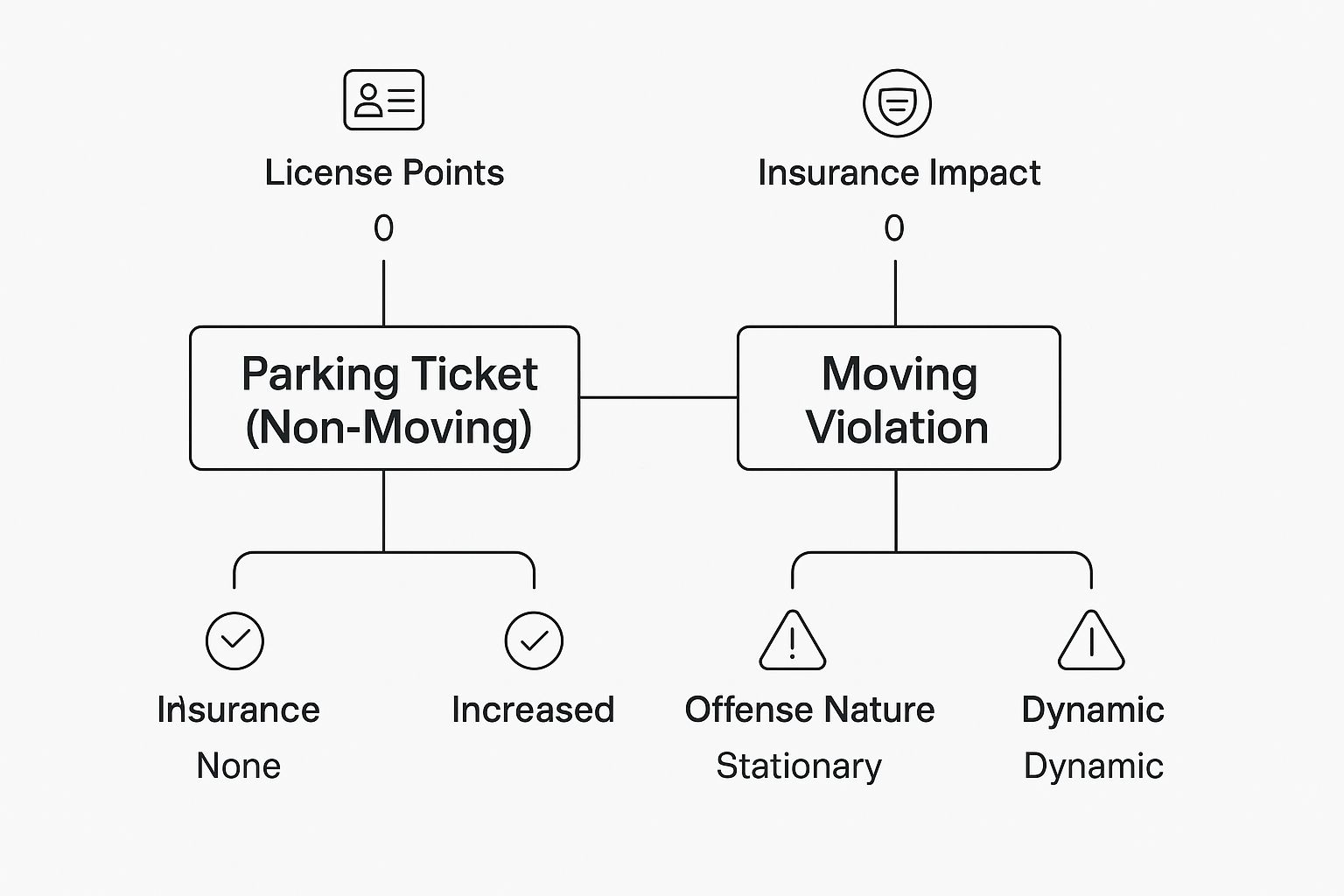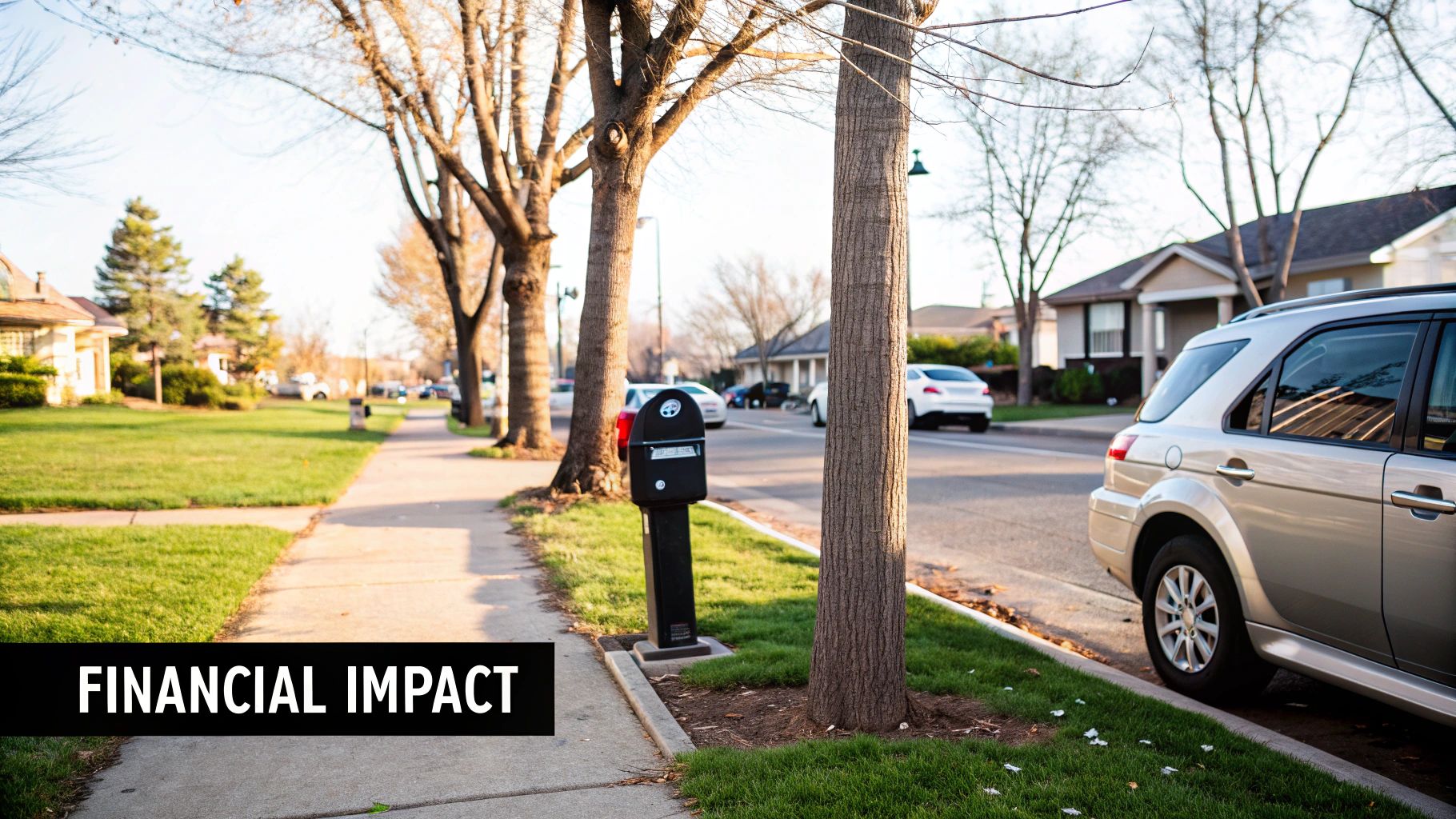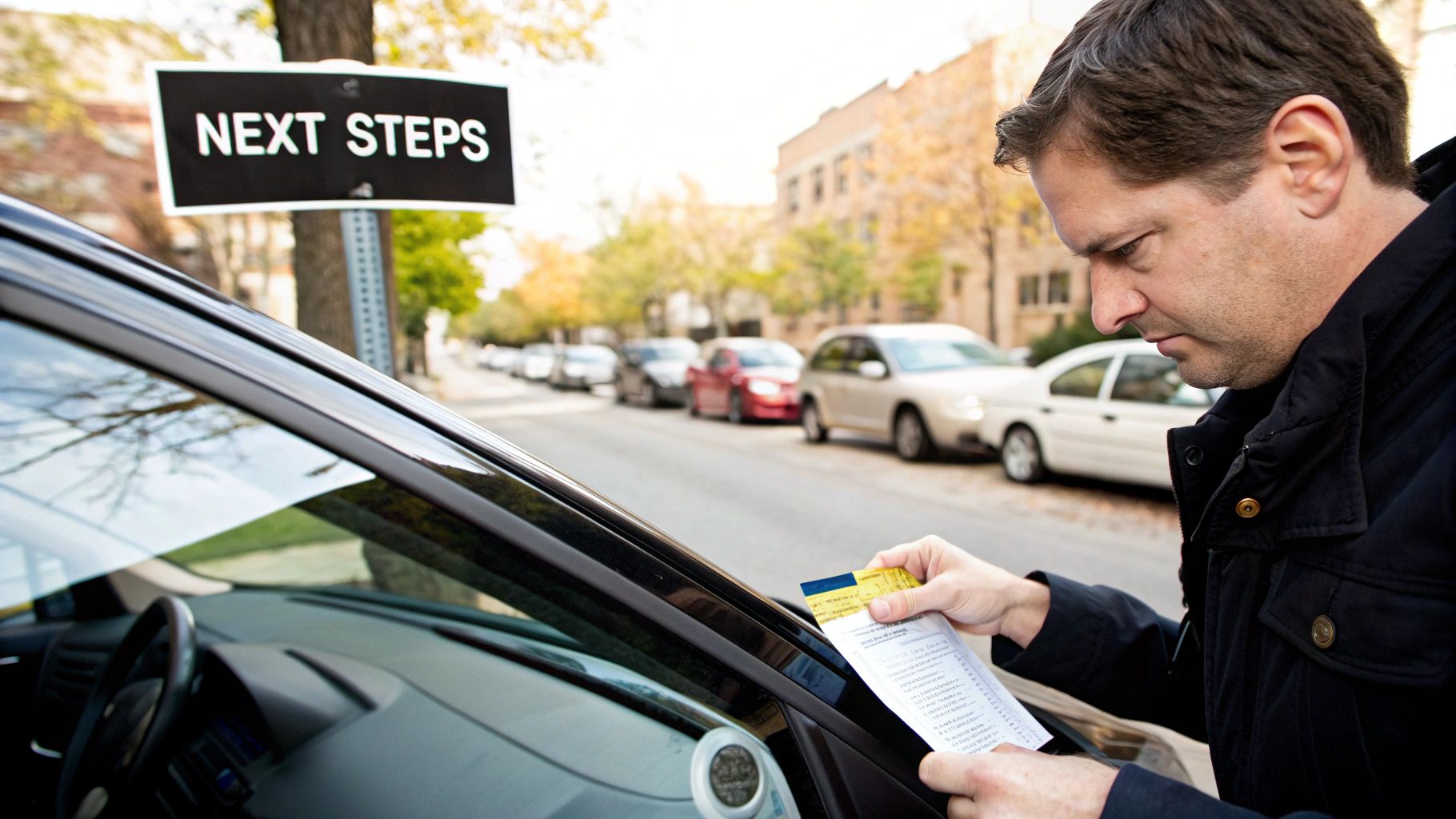
¿Es una multa de estacionamiento una infracción de tránsito? Una guía para conductores de Florida
¿Te preguntas si una multa de estacionamiento es una violación de tráfico? Aprende las diferencias y cómo afecta tu historial de conducción en Florida. ¡Haz clic para aprender más!
Esa sensación de hundimiento cuando ves un ticket escondido debajo del limpiaparabrisas es universal. Pero antes de que empieces a preocuparte por tu historial de conducción, es importante entender la clasificación: un ticket de estacionamiento es una violación no móvil.
Esta es una distinción crítica. Significa que, a diferencia de un ticket por exceso de velocidad, una citación por un parquímetro vencido o estacionar en una zona de no estacionamiento típicamente no sumará puntos a tu licencia de conducir ni causará directamente que tus tarifas de seguro aumenten.
La Diferencia Entre Tickets de Estacionamiento y Violaciones Móviles
Entonces, ¿qué separa estos dos tipos de tickets? Todo se reduce a una pregunta simple: ¿estaba tu auto en movimiento cuando ocurrió la infracción?
Una violación móvil, como pasar un semáforo en rojo o acelerar, ocurre mientras estás conduciendo activamente. Estas se consideran más graves porque impactan directamente la seguridad pública. Un ticket de estacionamiento, por otro lado, es por una regla rota mientras tu vehículo está estacionario. Piénsalo como un problema con dónde dejaste tu auto, no cómo lo estabas conduciendo.
Esta infografía resume las diferencias clave de un vistazo.

Como puedes ver, las consecuencias son mundos aparte. Las violaciones móviles pueden llevar a puntos en la licencia y aumentos en el seguro, mientras que los tickets de estacionamiento generalmente se limitan a multas.
Violaciones Móviles vs. No Móviles de Un Vistazo
Para hacerlo aún más claro, desglosaremos las diferencias clave lado a lado. Esta tabla resalta lo que realmente importa para los conductores de Florida cuando reciben un ticket.
Atributo | Violación Móvil (p. ej., Exceso de Velocidad) | Violación No Móvil (p. ej., Ticket de Estacionamiento) |
|---|---|---|
Estado del Vehículo | Auto en movimiento | Auto estacionario |
Impacto en el Historial de Conducción | Agrega puntos a tu licencia | No se agregan puntos |
Consecuencias del Seguro | Con frecuencia lleva a primas más altas | Típicamente no afecta las tarifas de seguro |
Penalidad Principal | Multas, puntos, posible suspensión de licencia | Solo multa financiera |
Naturaleza de la Infracción | Relación con la seguridad, refleja el comportamiento del conductor | Cuestión administrativa o regulatoria |
Esta tabla muestra por qué es tan importante saber qué tipo de ticket estás manejando. El impacto a largo plazo en tu bolsillo y privilegios de conducción depende enteramente de esta clasificación.
Por Qué Esta Distinción Es Importante
En su esencia, la ley de tránsito trata estas violaciones de manera diferente por una razón. Un ticket de estacionamiento es fundamentalmente un problema administrativo: rompiste una regla sobre dónde se puede dejar un auto. Es molesto, pero no dice nada sobre tus habilidades o seguridad detrás del volante.
Sin embargo, una violación móvil es un reflejo directo de tus acciones como conductor en la carretera. Debido a que implica riesgo para ti y otros, las penalidades están diseñadas para ser un gran problema. Si te gustaría profundizar, puedes aprender más sobre cómo se clasifican los tickets de tránsito.
Por Qué la Ley de Florida Trata Estas Violaciones de Manera Tan Diferente
Para entender por qué un ticket de estacionamiento es un juego completamente diferente que una violación móvil, debes mirar lo que las leyes de tránsito de Florida intentan lograr. Todo el sistema está construido sobre una idea simple y poderosa: la seguridad pública. La ley de Florida traza una línea clara entre estos dos tipos de tickets basada en una cosa: cuánta riesgo crean tus acciones para todos los demás en la carretera.
Piénsalo de esta manera. Una violación no móvil, como ese molesto ticket de estacionamiento, es como recibir una penalización por dejar tu equipo en el lugar equivocado en la línea de banda de un partido de fútbol. Claro, es en contra de las reglas, pero no puso en peligro a ninguno de los jugadores en el campo. Rompiste una regla administrativa, pero la seguridad de nadie estuvo en juego.
Una violación móvil, por otro lado, es una historia completamente diferente. Eso es como hacer un tackle peligroso e ilegal que podría herir gravemente a otro jugador. Cosas como exceso de velocidad o pasarse un alto ocurren mientras tu auto está en movimiento y ponen activamente a otras personas en riesgo. Debido a eso, la ley es mucho más severa.
La Lógica Detrás de la Ley
En esencia, la ley de Florida define una violación móvil como cualquier cosa que suceda mientras el auto está físicamente en movimiento. Es un reflejo directo de las acciones del conductor detrás del volante. Las penalidades—como puntos en tu licencia y aumentos en el seguro—están diseñadas para detener la conducción peligrosa. Y esto no es solo una cuestión de Florida.
Esta distinción básica es reconocida prácticamente en todas partes. Globalmente, hay una gran diferencia entre cómo los tickets de estacionamiento y las violaciones móviles afectan los datos de seguridad del conductor y las tarifas de seguro. Las violaciones móviles son un ingrediente clave en cómo las compañías de seguros determinan cuán arriesgado eres como conductor. ¿Tickets de estacionamiento? Ni siquiera se registran en esa escala porque ocurren cuando el vehículo está detenido. Si tienes curiosidad sobre cómo otros lugares manejan esto, puedes leer sobre algunas perspectivas globales sobre leyes de tránsito en weforum.org.
En resumen, una violación móvil es una marca negra contra tu comportamiento de conducción, mientras que un ticket de estacionamiento es una penalización por la ubicación de tu vehículo.
Esta es la razón fundamental por la que uno puede impactar tu historial de conducción y el otro solo golpea tu bolsillo. Comprender este concepto es el primer paso para averiguar qué hacer con cualquier ticket que recibas. Si te preocupa cómo los puntos de una violación móvil podrían afectar tu licencia, es una buena idea consultar el sistema de puntos de tickets de tránsito de Florida en nuestra guía completa.
¿Qué Sucede Realmente Cuando Recibes un Ticket de Estacionamiento?
Así que, encontraste un ticket de estacionamiento en tu limpiaparabrisas. ¿La buena noticia? No sumará ningún punto a tu licencia. Pero eso es hasta donde llegan las buenas noticias. Si bien es un alivio saber que tu historial de conducción está a salvo, ignorar el ticket es un gran error. Las consecuencias son muy reales, comenzando con tu billetera y escalando rápidamente desde allí.

El primer golpe es la multa en sí, pero eso es solo el comienzo. Si pierdes la fecha de pago, comienza un nuevo conjunto de problemas. Se añaden cargos por demora, convirtiendo rápidamente esa molesta multa en un problema mucho más caro.
Las ciudades utilizan los tickets de estacionamiento como una herramienta administrativa importante. Por ejemplo, algunas ciudades importantes emiten miles de citaciones de estacionamiento diariamente. Esto no se trata de castigar la conducción peligrosa; se trata de gestionar vehículos estacionarios, que es exactamente por qué un ticket de estacionamiento es una violación no móvil.
No Lo Tires: Los Verdaderos Riesgos de Ignorar un Ticket de Estacionamiento
¿Pensando que puedes simplemente olvidarlo? Piénsalo de nuevo. Esa simple multa no pagada puede convertirse en serios dolores de cabeza administrativos que pueden literalmente sacarte el auto de la carretera.
A continuación se muestra cómo las cosas pueden escalar si lo dejas pasar:
Multas Desorbitadas: Esa cantidad inicial seguirá creciendo con los cargos por demora y penalizaciones. Lo que comenzó como un pequeño gasto puede convertirse en una deuda significativa.
El Temido Botón o Remolque: Si acumulas suficientes tickets no pagados, podrías salir y encontrar tu auto inmovilizado con un botón o, peor, completamente desaparecido—remolcado a un lote de depósito. Recuperarlo te costará. Mucho.
Registro en Bloqueo: En Florida, el estado puede poner un bloqueo en la renovación de tu registro vehicular hasta que se paguen todos tus multas pendientes. Eso significa que no puedes conducir legalmente tu auto. Punto.
Aunque estas consecuencias no suman puntos a tu licencia, pueden crear una enorme cantidad de estrés y gastos. Una violación móvil afecta tu historial de conducción, pero un ticket de estacionamiento no pagado puede impedirte usar tu auto por completo. Para una exploración más profunda de lo que aparece en tu historial, puedes leer nuestra guía sobre cuánto tiempo permanecen los tickets de tránsito en tu historial.
En resumen: lo mejor que puedes hacer es lidiar con la citación de inmediato.
Por Qué las Violaciones Móviles Son un Problema Mucho Mayor
Para realmente entender por qué la respuesta a "¿es un ticket de estacionamiento una violación móvil?" es un firme "no", solo tienes que mirar lo que estás evitando. Las penalidades por una violación móvil en Florida son serias—están diseñadas de esa manera porque atacan acciones peligrosas detrás del volante. Estamos hablando de consecuencias que van mucho más allá de una simple multa, potencialmente impactando tu licencia y tu billetera durante años.

A diferencia de un ticket de estacionamiento, una violación móvil impacta directamente tu historial de conducción a través del sistema de puntos de licencia de Florida. Piensa en este sistema como la forma del estado de llevar la cuenta de tus hábitos de conducción. Cada violación móvil, desde exceso de velocidad hasta pasar un alto, añade un número determinado de puntos a tu licencia.
Cómo los Puntos Pueden Arruinar Tus Privilegios de Conducción
Estos puntos no son solo números imaginarios; son trampas para algunas penalidades bastante severas. Cuantos más puntos acumules en poco tiempo, peor será. Es este efecto bola de nieve lo que hace que mantener tu historial limpio sea tan increíblemente importante.
A continuación se muestra lo que sucede cuando los puntos empiezan a acumularse:
Suspensiones de Licencia: Conseguir solo 12 puntos dentro de un período de 12 meses te dará una suspensión de licencia de 30 días. Y solo se pone peor desde allí, con suspensiones que pueden extenderse hasta un año completo si no tienes cuidado.
Primas de Seguro Desorbitadas: Las compañías de seguros ven los puntos como una enorme bandera roja que señala riesgo. Incluso una violación móvil puede aumentar tus tarifas de seguro de auto, costándote potencialmente miles de dólares en los próximos años.
Escuela de Tráfico Forzada: A veces, podrías ser ordenado a asistir a un curso de mejora del conductor. Si bien esto puede ayudarte ocasionalmente a evitar puntos, aún cuesta tu tiempo y dinero.
La conclusión es esta: un ticket de estacionamiento es un dolor financiero de una sola vez. Una violación móvil es una marca en tu historial de conducción que puede desencadenar un problema financiero y legal en aumento.
Nuestro objetivo es proteger tu licencia y historial de estas graves repercusiones. Los resultados pasados no garantizan futuros resultados, pero un historial limpio siempre es el objetivo.
Qué Hacer Cuando Recibes un Ticket de Estacionamiento
Todos hemos estado allí. Esa sensación de hundimiento cuando ves un trozo de papel escondido debajo de tu limpiaparabrisas. Es frustrante, por decir lo menos. Pero lo que hagas a continuación puede hacer una gran diferencia.
¿Tu primer movimiento? Respira hondo y mira de cerca el ticket. Querrás encontrar el código de la infracción, la fecha y hora, y—lo más importante—la fecha límite para responder. Perder esa fecha es una forma segura de convertir un pequeño dolor de cabeza en uno más grande con penalidades adicionales.

Una vez que tengas los detalles, tienes dos caminos principales que puedes seguir. El primero, y más común, es simplemente pagar la multa y dejarlo atrás. Las ciudades hacen esto bastante fácil.
La otra opción es impugnar el ticket. Muchas personas piensan que dado que un ticket de estacionamiento es una violación no móvil, no vale la pena pelearlo. Esa es una percepción errónea. Tienes el derecho de impugnar cualquier citación, incluido un ticket de estacionamiento.
Elegir Tu Camino: ¿Pagar o Impugnar?
Entonces, ¿cuál es? ¿Debes pagar o luchar? Realmente depende de tu situación específica. Pagar es simple y rápido, pero si tienes el presentimiento de que el ticket fue emitido por error, impugnarlo podría ser la decisión correcta.
Métodos Comunes de Pago:
En Línea: La mayoría de los municipios tienen un portal donde puedes pagar con una tarjeta de crédito o débito en minutos.
Por Correo: Por lo general, puedes simplemente enviar un cheque o giro postal a la dirección en la citación.
En Persona: Si lo prefieres, siempre puedes visitar una oficina designada del condado o la ciudad.
Impugnar un ticket de estacionamiento es más común de lo que piensas. Podrías tener un caso sólido si la señalización era confusa o estaba oculta, el parquímetro estaba roto, o hay un error claro en el ticket mismo—como el número de placa incorrecto.
Nuestro objetivo es proporcionarte la información que necesitas para tomar una decisión segura. Si bien un ticket de estacionamiento no es tan grave como una violación móvil, aún tienes derechos. Todo comienza con conocer tus opciones y actuar antes de que esa fecha límite se te acerque.
Cómo Un Abogado de Tráfico Puede Ayudar con Todas las Citaciones
Ya sea un simple ticket de estacionamiento o algo más serio, recibir cualquier tipo de citación es estresante. Te quedas preguntándote qué hacer a continuación y cuáles serán las consecuencias. Comprender tus derechos es el primer paso, y un bufete de abogados de tráfico que se enfoca en estos asuntos puede hacer una diferencia significativa.
Cuando se trata de violaciones móviles serias como exceso de velocidad o pasarse un semáforo en rojo, las apuestas aumentan considerablemente. Estas no son solo molestias menores; son amenazas directas a tu historial de conducción, tu licencia y tus primas de seguro. Un abogado que maneja asuntos de defensa de tráfico sabe qué buscar—desde errores de procedimiento del oficial hasta debilidades en la evidencia en tu contra. Nuestro objetivo es proteger tu licencia y historial.
Protegiendo Tu Historial de Conducción
Aunque un ticket parezca claro y directo, a menudo hay un camino hacia un mejor resultado. Un abogado puede trabajar en negociar con los fiscales o representarte en la corte, siempre buscando una desestimación, reducción de cargos o minimizar penalidades.
¿El objetivo principal? Mantener esos puntos dañinos fuera de tu licencia. Para obtener una mejor idea de lo que puede ser posible, consulta nuestra guía sobre las posibilidades de que se desestime un ticket por exceso de velocidad.
Si has recibido cualquier ticket de tránsito, puedes llamar para una consulta gratuita para revisar los detalles de tu caso. Enviar información a través de nuestros formularios no crea una relación abogado-cliente.
Publicidad del abogado. Oficina en Broward. Los resultados pasados no garantizan futuros resultados.
Algunas Preguntas Más Sobre Tickets en Florida Respondidas
Hemos cubierto mucho terreno, desde la diferencia entre violaciones móviles y no móviles hasta lo que realmente significan estos puntos para tu licencia. Para resumirlo todo, abordemos algunas preguntas más comunes que los conductores de Florida hacen.
¿Un Ticket de Estacionamiento No Pagado Me Hará Arrestar?
Respira hondo—generalmente, no. En Florida, los tickets de estacionamiento no pagados son asuntos civiles, no criminales. No se emitirá una orden de arresto solo porque te olvidaste de pagar una multa de un parquímetro.
Pero no lo ignores. Las consecuencias definitivamente empeorarán con el tiempo. Estarás enfrentando multas crecientes, la molestia de tratar con agencias de cobranza, y eventualmente, una retención en el registro de tu vehículo. Así que aunque no te pondrán en grilletes, pueden hacer que sea ilegal que conduzcas tu auto.
¿Qué Hay de los Tickets de Estacionamiento que Recibo Fuera del Estado?
¿Recibiste un ticket de estacionamiento en un viaje por carretera? Buenas noticias: un ticket de estacionamiento de otro estado no sumará puntos a tu licencia de conducir de Florida. Sigue siendo una violación no móvil, sin importar dónde lo obtuviste.
Dicho esto, no puedes simplemente tirarlo y olvidarlo. El estado que emitió el ticket aún puede reclamarte el dinero. Podrían reportar la deuda impaga a las agencias de crédito o incluso bloquearte para registrar un auto en ese estado más adelante. Es un dolor de cabeza que no necesitas.
Conclusión Clave: Incluso las violaciones no móviles muy serias típicamente no sumarán puntos a tu licencia de Florida. Por ejemplo, estacionar en un lugar para discapacitados sin un permiso conlleva una multa masiva, pero cero puntos se añaden a tu registro.
¿Tienes más preguntas sobre los detalles de la ley de tránsito? Puedes encontrar un montón de respuestas detalladas en nuestra página de preguntas frecuentes sobre tickets de tránsito en Florida.
Ya sea que estés lidiando con un simple ticket de estacionamiento o una violación móvil seria, el equipo de Ticket Shield, PLLC puede ayudar. Nuestra práctica se centra en la defensa de tráfico y DUI, diseñada para proteger tu historial de conducción y mantener las penalidades al mínimo. Comunícate para una consulta gratuita para hablar sobre tu caso. https://www.ticketshield.com


